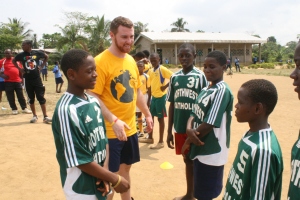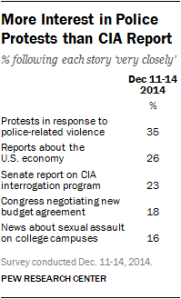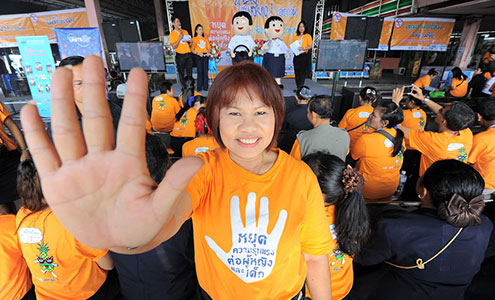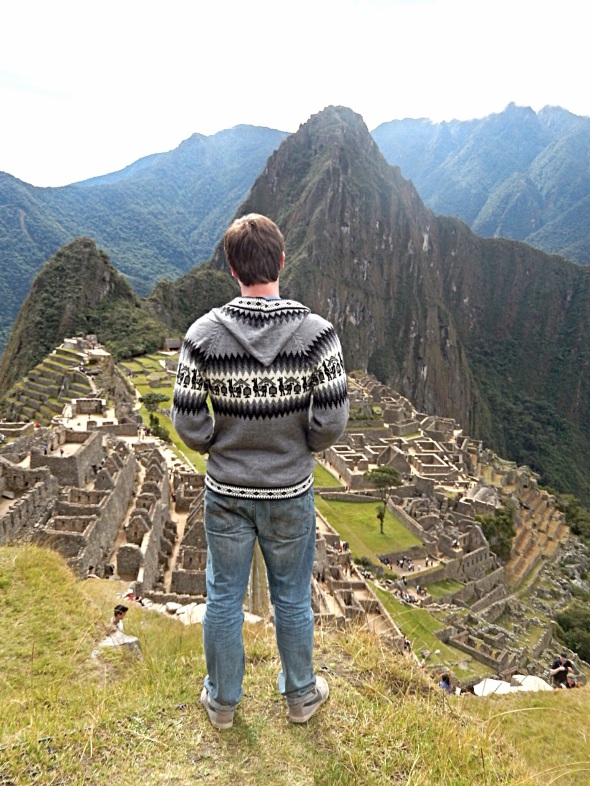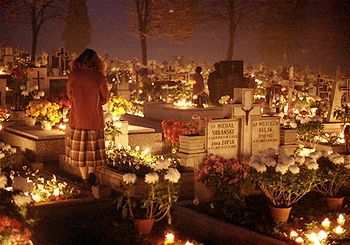ANNOUNCEMENT: Blog moving
Posted: September 4, 2015 Filed under: Uncategorized Leave a commentHello to you all,
Thank you so much for following our blog over the years. We are pleased to announce that our blog will now be housed on our main website. You can view it here: http://www.worldpittsburgh.org/ under News–>Council Blog.
Thank you again for all your continued support and we look forward to engaging with you on future posts!
Guest Post – Becoming a Caring Global Citizen: A Global Travel Scholar’s Push to Help End World Hunger
Posted: August 12, 2015 Filed under: Global Travel Scholarship | Tags: global citizen, global travel scholarship, guest post, world hunger Leave a commentBelow is a guest post from one of our Global Travel Scholars, Matthew McDonald. Through the program, Matthew received a scholarship to travel to Botswana in the Summer of 2014. While in Botswana, Matthew lived with rural host families in a village south of the capital, as well as in northern Botswana, where he ate traditional food, practiced the native language, and generally learned about the culture of Botswana through immersion and participation. In the blog post below, Matthew illustrates how his experiences in the Global Travel Scholarship Program expanded his world view and inspired him to start an effort to bring local attention to the global issue of hunger.
Last summer, I had the incredible opportunity to travel abroad and study the wildlife, ecology, and culture of Botswana, Africa thanks to the World Affairs Council of Pittsburgh’s Global Travel Scholarship Program. My experiences abroad, as well as knowing the World Affairs Council of Pittsburgh’s mission to spread global awareness, made me eager to make a difference in my own community. I thought to myself, “How can I help the people around me become more globally aware?” Then, it hit me. Each year my school’s chapter of the National Future Farmers of America (FFA) Organization, H.G. Parkinson FFA, which I was President of, holds an open house for community members and students at my school. During this open house, we showcase our FFA chapter and educate others about agriculture.
 Typically, members present about agriculture in our area and in America at large. This year however, I initiated a theme that discussed agriculture from all around the globe, including how people in certain areas of our world are faced with malnourishment and what organizations are doing to help prevent this. Each group of members chose a different country and created a presentation about the agriculture found there, while the senior officers of our chapter, including myself, presented about organizations that are seeking to create a food-secure world. Some of these organizations included World Vision, Project Heifer, and our local food banks.
Typically, members present about agriculture in our area and in America at large. This year however, I initiated a theme that discussed agriculture from all around the globe, including how people in certain areas of our world are faced with malnourishment and what organizations are doing to help prevent this. Each group of members chose a different country and created a presentation about the agriculture found there, while the senior officers of our chapter, including myself, presented about organizations that are seeking to create a food-secure world. Some of these organizations included World Vision, Project Heifer, and our local food banks.
I was honored to present about Elanco’s Enough Movement. Elanco, a global animal health company, created a report called the “Enough Report” which outlines what it will take to feed our growing population. Within the next thirty-five years, the world’s population is expected to increase by nearly two billion people, making the total a whopping nine billion people. That said, we must find a way to not only feed the people of today, but also the people of tomorrow. Elanco is doing just that! They  have already outlined three solutions to creating a food-secure tomorrow: innovation, choice, and trade. Elanco says that by enabling innovation, allowing consumer choice, and reducing the politics of trade we can create a world where nobody has to go to bed hungry. I know what you are probably thinking — “This is great, but how in the world am I going to play a part in creating sustainable agriculture or reducing international tariffs on trade?” Well, fortunately for you, there is a way to get involved. Perhaps the simplest way we all can make a difference is by being advocates. How do we do this — how do we help provide organizations with necessary resources, educate people with the facts of world hunger, and spread the word? One way we can do this is on social media sites such as Facebook and Twitter. As part of my presentation, I had elementary students at my school get their picture taken behind a cardboard cutout that said, “We’ve had enough!” and posted them on Twitter using #feedthe9. As a result, we were spreading awareness and even gained the attention of Elanco themselves. It was that easy!
have already outlined three solutions to creating a food-secure tomorrow: innovation, choice, and trade. Elanco says that by enabling innovation, allowing consumer choice, and reducing the politics of trade we can create a world where nobody has to go to bed hungry. I know what you are probably thinking — “This is great, but how in the world am I going to play a part in creating sustainable agriculture or reducing international tariffs on trade?” Well, fortunately for you, there is a way to get involved. Perhaps the simplest way we all can make a difference is by being advocates. How do we do this — how do we help provide organizations with necessary resources, educate people with the facts of world hunger, and spread the word? One way we can do this is on social media sites such as Facebook and Twitter. As part of my presentation, I had elementary students at my school get their picture taken behind a cardboard cutout that said, “We’ve had enough!” and posted them on Twitter using #feedthe9. As a result, we were spreading awareness and even gained the attention of Elanco themselves. It was that easy!
You see, you do not have to be a farmer, scientist, or a politician to play a part in creating a hunger-free world. You simply have to be an advocate. Everyday consumers like you and I have more than enough capability to earn this title and I hope that we all will. Let’s not stop here! Let’s continue the movement to create a more globally aware and hunger-free world! To learn more about the Elanco’s, “Enough Movement,” and how you can get involve, visit:
How will you join the movement and play your part in this life-saving mission?
Tweets from H.G. Parkinson FFA, Feb 2015, Twitter
Report from the Field – Sport for Development in Cameroon, Africa
Posted: March 6, 2015 Filed under: Uncategorized Leave a commentJustin Forzano is the founder and CEO of Cameroon Football Development Program (CFDP). He started the initiative to improve the lives of youth in Cameroon with the game of soccer. Because so many youth lack the resources and opportunity to succeed in such a challenging environment, CFDP aims to shine a spotlight on the potential for youth as future leaders and capacitate them with the skills they need to overcome the significant barriers of living in a developing country. To date, CFDP has worked with thousands of boys and girls in the Southwest Region of Cameroon.
I arrived in Douala, Cameroon around half past midnight. Inside the airport, perpetually under construction, I followed the fluorescent lights which guide weary travelers through a maze of control stations: the now-defunct Ebola screening station, a Yellow Fever checkpoint, the Police Control for visas, and finally into the main hall where the conveyor belt might just spit out all of your luggage if you are lucky. I was fortunate that both of my bags made it all the way from Pittsburgh after stops in DC and Brussels. Finally, I was back in my second home!
The car we hired flew through the darkness of the city without street lamps. It was only when we reach Rue de la Joie, or ‘street of joy’, did a few places shine light for us to see that roasted fish was still available. We shared a meal together and then made our way back to the home of my very good friend and brother, Epulle Ernest, better known as “Biggie” for the size of his muscles and his heart.
Up with the sun, we ventured to a local pitch to get in an early game of football (soccer) before the official start of the working day. Upon arrival at the field, we met a team of young adults who train there every morning. The team does not participate in any organized football competition – if you could call any football in Cameroon organized – aside from the occasional summer holiday tournament. The team does not have sponsorship nor do they play on a quality field. They lack quality equipment, playing with a busted ball the morning I met them at the field and wearing some faded, Chinese-made replica jerseys. But they are united. They know each other’s style of play on the field and support one another off the field. They represent the neighborhood. They give back to their community. Every Sunday morning they play 90+ minutes and then spend the next few hours in association-style meetings which sometimes continue into the afternoon. They sing club songs and traditional chants and share plenty bottles of mimbo (drinks) together. They represent the power of football in a country like Cameroon.
Later that afternoon, Biggie and I traveled to Kumba where the Cameroon Football Development Program, an organization I started back in 2010 after spending three summers in country with the University of Dayton School of Engineering, is based. We were met with a warm welcome from the local management team who oversees programs in 14 secondary schools and three community-based youth football leagues in as many different towns in the Southwest and Northwest Regions. It was there I delivered the news to some members of the team: we have been awarded a FIFA Football for Hope grant to support our league expansion in 2015!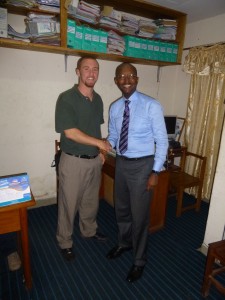
FIFA awarded this grant to support our innovative approach to integrating life skills, leadership and health education into competition. We call this our youth enrichment football league; where every season has a social/health theme and every match has a topic. We infuse the education right into the match procedures, so players and coaches learn and share information about important issues critical to the development of the whole community in the most engaging forum: a football game.
Over the next two weeks, I worked with my team to strategize the best approach to our expansion. We discussed the importance of balance between school programs, a new leadership initiative led by our in-house Peace Corps Volunteer, our girls programs, and this our FIFA-endorsed league expansion. We assigned responsibilities. Kama and Wallace would take care of all things concerning the league. Killian would manage the school programs and oversee distribution of thousands of pieces of soccer equipment donated by the Pittsburgh Riverhounds, City of Pittsburgh CitiParks Big League Sports, Avonworth High School Girls Soccer Team, and the dozens of other clubs who supported us in our last equipment drive. Nenne will continue in her role as communications director – making sure equipment donors in Pittsburgh know who receives their old jerseys and cleats. Caroline will collect the ever-so-important data to track our progress with monitoring and evaluation. Ashu manages the finances while Collins oversees the whole operation. The plan was set and my job was done… at least until Monday when I returned to Pittsburgh.
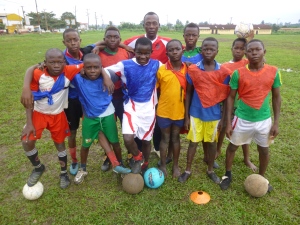 On Saturday, we headed to the beautiful beaches of the Atlantic in the coastal town of Limbe. Upon arrival, we quickly joined a few strangers in a thrilling game of beach soccer before going for a swim and then heading back to the airport. The work was not over, but had merely just begun.
On Saturday, we headed to the beautiful beaches of the Atlantic in the coastal town of Limbe. Upon arrival, we quickly joined a few strangers in a thrilling game of beach soccer before going for a swim and then heading back to the airport. The work was not over, but had merely just begun.
A week later, the Kumba community league kicked off it’s first-ever full season for under 14 boys. Six teams will compete in the season which runs into May. The theme is Gender Equality and the players and coaches have already begun to sensitize the community about the role of boys and men in promoting a more just and equitable society for girls and women.
Members of the Pittsburgh community are invited to get involved and become supporters of Cameroon Football Development Program (CFDP). Connect with a local nonprofit organization creating global impact, by visiting our website (www.cameroonfdp.org), signing up for the newsletter (www.cameroonfdp.org/get-the-newsletter) and following along on social media.
Facebook: www.facebook.com/theCFDP
Twitter: www.twitter.com/CameroonFDP
action/2015 launch: January 15, 2015
Posted: January 15, 2015 Filed under: Development, international development, Uncategorized Leave a commentThis blog post was written and researched by World Affairs Council Intern, Katie Brown.
According to new research, almost a billion extra people face a life of extreme poverty if leaders duck key decisions on poverty, inequality and climate change due to be discussed at two summits in New York and Paris later this year, with billions more continuing to face a life of hardship. That’s why organizations of all shapes and sizes across the globe are launching a new campaign called action/2015 to galvanize local and world leaders towards action to halt man-made climate change, eradicate poverty and address inequality.
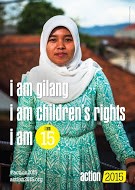 These new calculations released by action/2015 suggest that even in relatively conservative scenarios the number of people living in extreme poverty – on less than $1.25 a day – could be reduced from over a billion to 360 million by 2030. Estimates from other researchers show that the eradication of extreme poverty is achievable for the first time in history – a key objective of the campaign.
These new calculations released by action/2015 suggest that even in relatively conservative scenarios the number of people living in extreme poverty – on less than $1.25 a day – could be reduced from over a billion to 360 million by 2030. Estimates from other researchers show that the eradication of extreme poverty is achievable for the first time in history – a key objective of the campaign.
Conversely, if leaders fail to deliver and build on the growing momentum for ambitious change at the UN Special Summit on Sustainable Development in September and the UN Climate talks in Paris in December, the number of people living in extreme poverty could actually increase to 1.2 billion by 2030. This would be the first increase in a generation (since 1993) and almost a billion higher (886 million) than if ambitious action is taken.
Malala Yousafzai, Nobel Prize winner who put her life on the line for the right to education said;
People globally want an end to injustice, poverty and illiteracy. Our world is interconnected and youth are ready and mobilised more than ever to see real change take place. Together, we are demanding our leaders take action in 2015 and we must all do our part. I will continue to work tirelessly to call on world leaders to seize this opportunity to guarantee a free, quality primary and secondary education for every child. That is my goal and I hope that my voice will be heard as it is the voice of millions of children who want to go to school.”
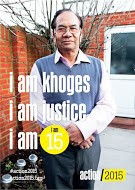 When accepting the Nobel Peace Prize, Malala announced the action/2015 campaign, which has since been joined by the efforts of high profile activists such as Queen Rania of Jordan, Bill and Melinda Gates and Mo Ibrahim, in addition to thousands of organizations in more than 120 countries around the world. Through the efforts of this diverse group of actors, the campaign is calling on world leaders to decisively act to eradicate poverty, prevent dangerous climate change and tackle inequality while at these summits. From well-known INGOs like Save the Children and Amnesty International to grassroots organizations working in local communities, the movement aims to make sure the agreements of 2015 are shaped by the people.
When accepting the Nobel Peace Prize, Malala announced the action/2015 campaign, which has since been joined by the efforts of high profile activists such as Queen Rania of Jordan, Bill and Melinda Gates and Mo Ibrahim, in addition to thousands of organizations in more than 120 countries around the world. Through the efforts of this diverse group of actors, the campaign is calling on world leaders to decisively act to eradicate poverty, prevent dangerous climate change and tackle inequality while at these summits. From well-known INGOs like Save the Children and Amnesty International to grassroots organizations working in local communities, the movement aims to make sure the agreements of 2015 are shaped by the people.
action/2015 is calling on the public, particularly youth, to join them in their efforts to instigate change and impress upon world leaders the importance of the issues to be discussed at the summits. Over the course of 2015, the campaign will provide ways for everyone to get involved to make progress in completing the following goals:
- An end to poverty in all its forms;
- The meeting of fundamental rights, tackling inequality and discrimination;
- An accelerated transition to 100% of renewable energy;
- A world where everyone can participate and hold their leaders accountable.
At part of the launch, activities are taking place in more than 50 countries all around the world. Many of these are spearheaded by 15 year olds – a constituency who will be among the most affected by the agreements:
- In Costa Rica, young people will take to their bicycles to raise the profile of the campaign in a cycle rally which will deliver the message of the campaign to leaders and the public.
- In India, young people are meeting their leaders in 15 states and over 150 districts to deliver their messages of hope for 2015.
- In Nigeria, 15-year-olds will present their hopes for the future to Finance Minister Ngozi Okonjo-Iweala at a live concert;
- In Norway, a delegation of 15 year old campaigners from across the country will meet with
- Prime Minister Erna Solberg to challenge her to play her part in the summits and secure a safe future for people and planet in 2015;
- In Uganda young people will challenge the Speaker of Parliament to listen to their demands when they hand over a petition signed by over 10,000 young people;
- In the UK, some of Britain’s leading youth activists will meet Prime Minister David Cameron and Ed Miliband, the Leader of the Opposition, to urge them to seize the opportunities of 2015.
Pittsburgh will also be participating in the action/2015 launch on January 15th as area students add their voices to youth from around the globe in a call for action for some of the world’s most serious issues. Through a video conference involving Avonworth High School, Cornell School District, and Quaker Valley High School of Pittsburgh, Northwestern High School in Erie, Del Valle High School in Texas, Colegio Newland in Mexico, and Kherad School in Iran, students will discuss how world leaders should address the problems most important to them. They will hear from Michael Klosson, Vice President for Policy and Humanitarian Response for Save the Children, based in Washington, D.C. Students will also participate in the global digital rally by contributing to a “selfie” campaign in which they will share their dreams for the future. These students will join millions around the world in speaking up for a desire for change.
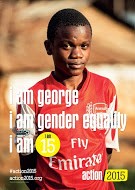 In addition, two students from Cornell High School have been selected to visit Washington, D.C. as part of the launch. Held in partnership among the ONE Campaign and Save the Children, the students will have the opportunity to meet with a high level representative at the White House to share the changes they would like to see in the next 15 years. They will also have the opportunity to tour the nation’s capital. The Cornell students will be joined by 15 year-olds from across the country.
In addition, two students from Cornell High School have been selected to visit Washington, D.C. as part of the launch. Held in partnership among the ONE Campaign and Save the Children, the students will have the opportunity to meet with a high level representative at the White House to share the changes they would like to see in the next 15 years. They will also have the opportunity to tour the nation’s capital. The Cornell students will be joined by 15 year-olds from across the country.
Throughout the program, these students will be encouraged to voice their own hopes for change during the next fifteen years as they look towards a time when they will be the leaders responsible for these issues. Speaking about why she got involved in the campaign, Maryam, a Nigerian child rights activist, who will turn 15 this year said:
“By 2030, I will be an adult, and may have children of my own. My generation might not be the ones making decisions today, but we will be the ones to make sure that our leaders take full responsibility for the actions they take this year.
action/2015 will be a platform for young people just like Maryam and our Pittsburgh students, not only giving them a chance call for action now, but also making them actors for their own futures.
Civil Liberties: A Privilege, Not a Right? A look at the flexibility of human rights in security issues
Posted: December 18, 2014 Filed under: Uncategorized Leave a comment Source: American Constitution Society for Law and Policy
Source: American Constitution Society for Law and Policy
Last week the U.S. Senate released a controversial report on the Central Intelligence Agency’s use of torture in the interrogation of terrorists and suspected terrorists. The report argues that torture is ineffective as an interrogation technique and is therefore unjustified. The CIA promptly countered the criticism with a media blitz. Former intelligence officers and officials launched the website CIAsavedlives.com maintaining that their actions prevented terrorist attacks, preserved U.S. national security, and protected the lives of Americans at home and abroad. Perhaps what is the least controversial about the report is what is being investigated. The Senate report questions the efficacy of the use of torture in interrogations; not the ethics. Though some argue that publishing the report is harmful to national security, the silver lining is that it sparked discussions on an important subject: the delicate balance of civil liberties in issues of national security.
In democracies, the protection of individual rights take priority over the protection of society as a whole—in the post-9/11 world, this tends to clash with national security policies. The government has an obligation is to keep its citizens safe, which is easier to accomplish by using tactics that violate constitutional rights. Furthermore, since intelligence operations and interrogations are classified, the public will never know if the ends truly justify the means. The U.S. frequently faces criticism from the international community for using interrogation tactics that blatantly violate principles of American democracy. These criticisms strike a chord with U.S. foreign policy makers because it contradicts the American principles which they preach to both our allies and our foes. However, this isn’t an issue that is unique to the U.S.—many other countries have also struggled to balance individual rights with the protection of society.
Cuba
Although there aren’t many that expect Cuba to spearhead international civil rights initiatives, their response to the HIV/AIDS epidemic does little to respect patients’ rights. Under the current policy, testing for HIV/AIDS is mandatory and, if infected, patients are placed in a state-run sanitarium for a period no less than 6-8 weeks. In the sanitariums, patients receive education about the disease, transmission, prevention, and how to live a healthy live while infected. Patients still have the expectation of privacy and those that are employed are still entitled to receive their regular pay while being treated. After the mandatory term of six to eight weeks, patients can either stay in the sanitarium indefinitely or they can go back home and resume their lives as they were prior to their diagnoses. Notwithstanding the obvious ethical dilemmas this policy poses, it is extremely effective. Among sexually active adults in Cuba, the rate of HIV/AIDS transmission is 0.1%.
Liberia
As the country hit the hardest by the Ebola virus, Liberia has struggled to balance public health with civil liberties in its efforts to stop the pandemic. This is especially challenging for Liberia because of its weak governance, poor infrastructure, and a virtually nonexistent healthcare system due to a series of prolonged and destructive civil wars that occurred from the late 1980s to about 2004. The United Nations maintains a force of approximately 15,000 peace keeping troops in Liberia constituting one of its largest peacekeeping operations.
Instability and conflict have been part of life for Liberia for nearly 3 decades, so when the new threat to security was biological, the leadership was unprepared to implement countermeasures. Once the pandemic advanced beyond management, Liberian leadership enacted strict quarantines for Ebola patients in an effort to get ahead of its advance. The quarantines were mismanaged, with patients not receiving the care they needed or being allowed to leave. There were even reports of people under quarantine that were not diagnosed with Ebola or even exhibiting symptoms.
Turkey
As the next door neighbor to Syria, Turkey is on the front lines in the fight against the Islamic State (IS). The spillover from the Syrian conflict—the influx of several thousand Syrian refugees and preventing extremist violence from spreading to Turkey—has generated huge challenges for Turkish government and law enforcement. In response to the IS threat, the Turkish Parliament is facing criticism for its new legislation. Turkey’s new laws are similar to what the United States was trying to accomplish with the Patriot Act. While the United States relies upon military and intelligence responses to terrorism, many European and Asian countries emphasize policing and law enforcement to combatting predicate offenses to terrorism. As such, the legislation gives broader authority for Turkish law enforcement to:
- Search people and vehicles
- Detain people for up to 48 hours without prosecutorial authorization
- Increased penalties for protesters disseminating propaganda or inciting terrorism
- Use firearms in their efforts to prevent attacks or bombings of public buildings
- Take instructions from governors to pursue particular crimes or individuals suspected of criminal behavior
Understandably, there are negative reactions to the new legislation mainly because of the potential for police to abuse their authority. Additionally, allowing police to take instruction from governors to pursue particular crimes or individuals is a breach of the system of checks and balances. However, IS presents a serious threat to the safety of Turkish citizens and to Turkish national security. The new legislation may be able to help law enforcement prevent attacks on Turkish citizens.
A Fine Line
A Pew Research Center poll attempted to take the temperature of the public’s reaction to the torture report. The poll found that 51% of Americans believe post-9/11 interrogation tactics are effective to prevent terrorist attacks. Of those remaining, 29% think it is unjustified and 20% don’t know. While a majority of Republicans think the interrogation methods are justified, Democrats are split on the issue.
Source: PEW National Survey on CIA Interrogation Methods
Based on the majority of public opinion on these issues and a multitude of similarly controversial policies across the globe, it would appear that this imbalance will be an enduring issue. Taking the CIA interrogation issue as an example, we can conclude that if there is no decisive opinion, public sentiment can sway in either direction. If government gives more priority to national security than to civil liberties, the public may grow weary of the pattern of intrusion. Since younger demographics are the group which take the most issue with government privacy intrusions and rights violations, this may be the more likely scenario. If opinion sways in the other direction, it is possible that we can see an alarmingly disproportionate relationship between the protection of individual rights and invasive national security policies. We would see a decline in the protection of civil liberties and an increasingly broad definition of what constitutes a national security threat. The questions remain:
How have we drawn the line between civil liberties and national security?
How will these decisions evolve over time?
What can we do to keep our rights and remain vigilant against security threats at the same time?
Source: PEW National Survey on CIA Interrogation Methods
The most pertinent question we can ask however, is: why aren’t more people paying attention to this? The Washington Post’s reaction to the Pew study questions what effect pubic disinterest had on the results. The survey showed that only 23% of Americans followed the story closely. Interest in CIA interrogation methods lagged behind domestic issues like police brutality, the state of the U.S. economy, and sexual assault on college campuses. In order to solve the problem, the American public first needs to decide if one exists. International comparisons, like the ones outlined in this post, can help to put the issue in context to decide where the line should be between upholding civil liberties and national security.
International Day for Elimination of Violence Against Women – November 25
Posted: November 20, 2014 Filed under: Human Rights Leave a commentThis blog post was researched and written by Intern Jocelyn Inlay.
One act of violence can cause a chain of events that impact not only the victim, but their family and society at large as well. That is why November 25 is International Day for Elimination of Violence Against Women. Once again, the United Nations will bring international attention to the issue through the Secretary General’s UNiTE campaign “Orange YOUR Neighborhood”. The 16 day campaign lasts from November 25 to December 10, Human Rights Day. During this time, ordinary people take the UNiTE campaign to their community by organizing “Orange Events”. They want people across the world to join together in saying “No” to violence and “Yes” to human rights.
Last year, men and women across the world stood together in solidarity, asking for an end to violence against women. They held events in their communities, in their workplace, and at their schools to raise awareness. FOU20 Awareness Initiative in Ciaro Egypt hosted a cycling event to show the power of community in advocating for gender equality. In Kubal, UN Women held a contest and cultural performance event to increase awareness of laws in Afghanistan which protect women and girls from violence. More than 100 people gathered to test and show their knowledge of laws on women’s rights. In Mexico, students lined the streets with signs and information about human rights.
Within the past months we have seen a lot of attention brought to the issue of domestic violence against women in the United States. In 2010 alone, 1,095 women were killed by their male partners. Approximately 42 million women in the United States will experience physical violence, rape and/or stalking by an intimate partner during their lifetime.
Unfortunately, the problem of violence against women is not confined to the United States. Women around the world suffer daily from violence in the form of physical, sexual, psychological, and economic abuse. Worldwide, approximately 30% of women who have been in a relationship have experienced domestic violence, and in some regions that number is even higher. Some national studies report the numbers being as high as 70%.
Empowering women regardless of whether or not they have been a victim of violence is a crucial step towards gender equality and ending the violence. Right here in Pittsburgh, there are many organizations working hard every day to help women. Check out these organizations to see what part they play in saying “Yes” to human rights.
Women’s Center and Shelter of Greater Pittsburgh
The mission of Women’s Center & Shelter is to advance the safety and wellbeing of victims of intimate partner violence and prevent and respond to intimate partner violence through social change.
Bethlehem Haven of Pittsburgh:
Bethlehem Haven’s mission is to provide a continuum of care for homeless women that leads toward self-sufficiency. Bethlehem Haven’s vision is to end homelessness through collaboration with the community and the people we serve.
The Center for Women Finding Solid Ground
The Center for Women helps women in transition achieve and maintain economic independence by providing and referring career, educational, and financial resources.
YWCA Greater Pittsburgh empowers women and their families, advocates for fair and equitable conditions, and challenges social and racial injustice.
The mission of Strong Women, Strong Girls is to raise ambition for women and girls by fostering cycles of mutual empowerment through mentoring.
Pennsylvania Women Work is dedicated to empowering women in transition through job readiness, emotional growth, education, training and employment. Pennsylvania Women Work provides free services to thousands of women each year.
Multi-lingual Santa Claus – Thursday 11/20/2014
Posted: November 17, 2014 Filed under: languages Leave a comment Attention multilingual families of Pittsburgh! Like any professional working in international affairs, Santa Claus has mastered several different languages over the years in order to communicate better with children all over the world. In addition to English, he speaks American Sign, Chinese, French, German, Japanese, Spanish, Swahili, and some Ukrainian. This Thursday morning at 10 a.m., Santa will be at his set on the lower level of the Robinson Mall. He is looking to meet with children who speak any of the languages above so that he can get a head start on Christmas preparations this year. The event will be covered by National Public Radio (NPR) and it is possible that local media will be present as well. If you have any children ages 2-16 who are multilingual and would be okay with speaking to the press (and Santa, of course!) stop down on Thursday to see him. You can also contact Carrie Butler, the Public Relations Consultant at The Mall at Robinson for more information: carrielynnbutler@gmail.com or 412-897-6177.
Attention multilingual families of Pittsburgh! Like any professional working in international affairs, Santa Claus has mastered several different languages over the years in order to communicate better with children all over the world. In addition to English, he speaks American Sign, Chinese, French, German, Japanese, Spanish, Swahili, and some Ukrainian. This Thursday morning at 10 a.m., Santa will be at his set on the lower level of the Robinson Mall. He is looking to meet with children who speak any of the languages above so that he can get a head start on Christmas preparations this year. The event will be covered by National Public Radio (NPR) and it is possible that local media will be present as well. If you have any children ages 2-16 who are multilingual and would be okay with speaking to the press (and Santa, of course!) stop down on Thursday to see him. You can also contact Carrie Butler, the Public Relations Consultant at The Mall at Robinson for more information: carrielynnbutler@gmail.com or 412-897-6177.
Consider taking your children out to support this globally-minded Christmas tradition.
International Internship and Study Aboard Opportunities
Posted: November 17, 2014 Filed under: Education, Global Travel Scholarship, Scholarship Leave a commentThere is a lot to be learned outside of the classroom! Whether you are thinking about college applications or possible career plans, a summer internship, study, or travel opportunity is worth considering, and with summer just around the corner many high school, undergraduate, and graduate students are doing just that.
To help start the search process for opportunities available this summer and throughout theschool year, we’ve compiled a list of some great internships, study abroad, and travel experiences in international affairs across a wide range of organizations. Use the information below as a beginning guide on your search, but be sure to do some research on your own as well! To help you out, we have listed some additional resources for more information.
Internship Opportunities
Amnesty International – Internship Opportunities: Amnesty International is a human rights organization that provides unpaid summer, fall, and spring internships to rising college juniors (and above) in New York, Washington D.C., Atlanta, San Francisco, and Boston.
Arms Control Association Internships: The Arms Control Association and Arms Control Todayoffer research and journalism internships in Washington, D.C. This internship program, offered in the spring, summer, and fall, is best suited for undergraduate students.
Asia-Pacific Economic Cooperation (APEC) Internships: APEC is an international affairs and economic organization that provides unpaid internships to graduate-level students who are nationals or permanent residents of APEC member economies. In some cases a financialstipend may be available. The Secretariat seeks candidates from a variety of academic disciplines, specifically those who have a strong interest in the work of international organizations and, in particular, international affairs and international economics.
The Carter Center Internship Program: Semester-long internships are open to undergraduate and graduate students and recent graduates in areas such as health, peace, and operations. These internships are unpaid and may take place in cities across the nation and abroad. Internship opportunities are offered year round.
Center for Strategic and International Studies – Internships: CSIS offers full and part-time internships in the fall, spring, and summer for undergraduates, advanced students, and recent graduates who are interested in gaining practical experience in public policy.
Central Intelligence Agency – Student Opportunities: The CIA has competitive internship opportunities available to undergraduate and graduate students in a range of fields, including analytical; business, IT, and security; clandestine service; language; and science, engineering and technology. The student opportunities page also includes information on scholarship and co-op programs, as well as ongoing opportunities for students of all ages. Due to the extensive application and background check required, interested applicants should apply 12 months prior to their desired start date. Applications for the Summer 2015 internship program are due March 31, 2014.
Council on Foreign Relations Internships: CFR offers volunteer internship opportunities for college students, graduate students, and recent graduates focusing on international relations and who are pursuing a career in foreign policy or a related field. Interns are recruited year-round on a semester basis to volunteer in both the New York and Washington, DC offices, and all internships are filled on a rolling basis.
Doctors Without Borders – Paid Internship Program: A very competitive program, Doctors Without Borders offers internships in many departments, including HIV/AIDs, Human Resources, Marketing, Medical Editing, Planned Giving, Public Events, Press, and Web. Internships take place in New York City. The deadline to apply for a summer internship is April 11, 2014.
European Union – Washington Delegation Internships: Open to college/university students and recent graduates, internships with the Washington Delegation are unpaid and preference is given to applicants who are available full-time. Internships are offered during the fall semester, spring semester, and summer.
Human Rights Watch Internships: Internships are available to undergraduate and graduate-level students, both within the U.S. and abroad.
International Monetary Fund Internships: The IMF offers approximately 50 paid summer (June – October) internships each year to highly qualified PhD students.
Korea Economic Institute Internships: Applicants to KEI should be graduate students (or exceptional undergraduate students) with a background in political science and/or economics as well as an interest in Asia-Pacific issues, especially Korea. Internships are offered for the fall, spring,and summer.
NATO Internships: The application window for a NATO internship is from March-April for the following year. Internships last 6 months, beginning in either September or March, and are based in Brussels, Belgium. Application requirements include an online application form, CV, and letter of motivation.
United Nations Internships: The UN Programme on Youth provides a list of internships available with the United Nations. Please visit each link for specific details and applicant criteria.
United States Commercial Service Internships: The U.S. Commercial service offers student volunteer internships at U.S. Field Offices, Headquarters, and International Field Offices. This page provides more information about applying to the different locations.
United States Department of State – Student Programs: This page offers information for high school, college, and graduate/post-graduate opportunities within the State Department. Please visit each opportunity for details and applicant criteria.
United States Office of Personnel Management – Student Jobs (USAJobs.gov): This website is the portal to all job and internship applications for the federal government for students and recent graduates. Internships can be found by searching the site for “internship.” This page also offers information on the Pathways Program, the Presidential Management Fellows Program, summer jobs, and volunteer experiences.
United States Senate or House of Representatives Internships: Many offices of government officials in the House of Representatives and United States Senate offer internships for high school students, undergraduates, and graduate students. A variety of opportunities can be found at the link provided. You are also encouraged to visit the professional website of a representative, senator, or committee for more detailed information.
USAID Internships: The U.S. Agency for International Development (USAID) offers paid and volunteer-based internships, both domestically and abroad, for college and graduate students.
White House Internships: Applicants for a White House internship must be U.S. citizens who will be at least 18 years old on the first day of the internship, and must be enrolled in an academic program. A completed application for this competitive program includes two essay questions, two letters of recommendation, and a resume.
World Affairs Councils: Like the World Affairs Council of Pittsburgh, many World Affairs Councils across the country offer internships at their organization. This link goes to the World Affairs Councils of America list of member Councils.
World Bank Internships: The World Bank offers paid internships in the summer (June-September) and winter (December-March), primarily in Washington, D.C. Applicants are required to be graduate or PhD students who have ideally completed one or more years of graduate-level education at the time of the internship.
Summer Travel and International Learning Opportunities
American Field Service (AFS)-International Programs: AFS is dedicated to building a more peaceful world through international student exchange. They offer many diverse study abroad programs for summer, semester, or academic-year terms to destinations around the globe for both high school and college students. They also maintain a detailed database of merit and need-based study abroad scholarships that will help fund your once-in-a-lifetime experience.
Amizade Global Service-Learning: This Pittsburgh-based nonprofit organization offers experiences for individuals and groups to travel abroad to participate in service-learning opportunities. There are also accredited study-abroad opportunities, offered in partnership with West Virginia University.
Council on International Education Exchange (CIEE): CIEE provides many international living options for students, including study, volunteer, gap-year and work exchanges in 15 countries. They also fund a limited number of full and partial scholarships for both high school and college study abroad programs.
Global Citizen Year: During this year-long total immersion program, offered to recent high school graduates, students will develop critical skills, master new tools, and learn from recognized experts all while living abroad and being fully immersed in a new culture. Programs are offered in Brazil, Ecuador, and Senegal, and last from the summer following high school graduation to the following April.
Global Scholar: An intensive two-week academic enrichment program that offers rising high school juniors and seniors the chance to sharpen their understanding of international affairs in a university setting. Global Scholar Prep is held at American University in Washington, D.C.
Kosciuszko Foundation Summer Study Abroad Programs: A variety of study abroad programs are offered by the Kosciuszko Foundation for study at the Catholic University of Lublin and Jagiellonian University of Cracow in Poland. Programs range in length and include courses in the Polish language, history, and culture with sightseeing trips on weekends. The deadline to apply is May 15, 2014.
National Geographic – Student Expeditions: Students completing 9th through 12th grades are eligible to participate in National Geographic Student Expeditions. There are four types of trips offered: expeditions, field workshops, photo workshops, and community service programs.
Summer at Georgetown: Georgetown University’s Summer Programs for High School Students include a range of activities, such as Institutes on International Relations and National Security/Counter-Intelligence; Fundamentals of Business: Leadership in a Global Economy; and summer courses on a range of international topics. The deadline to apply is April 15, 2014.
Summer Seminar on Global Issues: New in 2014, the Summer Seminar on Global Issues is a two-week, non-residential program offered by the World Affairs Council of Pittsburgh in partnership with the Global Studies Center and the University Center for International Studies at the University of Pittsburgh. Open to rising high school juniors and seniors, the Summer Seminar will expose students to a range of interdisciplinary global issues, and will include language study, presentations from regional experts, simulation and scenario activities, among others. The deadline to apply is April 30, 2014.
World Learning: A partner of the World Affairs Council of Pittsburgh’s Global Travel Scholarship Program, World Learning offers travel learning opportunities for high school and undergraduate students. The Experiment in International Living offers 3-5 week programs for high school students in 30 different countries, while SIT Study Abroad offers college students more than 70 semester, academic year, and summer programs around the world.
Youth for Understanding (YFU): YFU is a non-profit educational organization that offers opportunities for young people around the world to spend a summer, a semester, or a year with a host family in one of over 50 countries. They also offer guidelines and tips for raising the money necessary to study abroad and encourage checking in with a local YFU organization about available scholarships.
Women in Elected Leadership Worldwide: Guess Who’s on Top?
Posted: November 7, 2014 Filed under: Human Rights, women Leave a commentWomen make up 64% of the lower house of the legislature in the country that leads the world in elected female representatives. Can you guess which country this is?
It’s not the United States. For all of the opportunities it affords women, the U.S. ranks 85th in women elected with 18.3% female legislators. The United Kingdom? No, they rank at number 64 with 22.6% of women elected to Parliament. Many would then guess one of the Nordic countries. Still not correct, but close; Sweden is number five with 43.6%.
You probably wouldn’t guess that it is Rwanda, an African country which 20 years ago was in the midst of one of the most violent civil wars in history. Following the war, the new constitution implemented provided for a gender quota in Parliament, reserving 30% of its seats in the lower house for women. This decision was based on a study by the United Nations Commission on the Status of Women marking that particular percentage as a benchmark. With a majority of its lawmakers as women, Rwanda met this quota and then some. And that’s only the lower house of Parliament; Rwandan women are involved in politics from the local level, through the Parliament, and even to the national judiciary. Half of Rwanda’s Supreme Court Justices are women.
Sources: nationsonline.org, CIA World Factbook
After the war, in which approximately 800,000 people were killed in genocide, Rwanda began to rebuild and Rwandan women had an integral role in the country’s healing. There are many factors that can be attributed to Rwanda’s progress and many are because, not in spite of, the 1994 conflict.
Women were responsible for most, if not all of the post-war reconstruction. This was mostly because of the demographic realities of the time: as a result of the genocide, over 70% of Rwanda’s population was female for the first few years after the war. Women cared for orphaned children, implemented a massive adoption campaign, supported widows, and gradually rebuilt the country’s infrastructure. Many of the current men in leadership were raised by single mothers in refugee camps. For them, seeing women as leaders is normal, not a benchmark. Gender-based repression and violence before and during the war was also a huge factor in the advancement of women in elected leadership. In the trials after the war, rape was prosecuted as an act of genocide and laws have since been enacted to prevent violence against women.
What can the rest of the world learn from Rwanda?
In order to get more women in public office in the U.S., more political recruitment may be in order. Psychologically, women have a tendency to be less self-confident than men and will judge their failures and accomplishments more harshly. Publicizing failure in a run for public office is likely a deterrent for many qualified women that simply lack confidence. Another strong deterrent for women is concern about balancing personal life with time commitment and other the obligations that come with public leadership.
It may be especially beneficial to have women in elected political leadership in developing countries. A study by Columbia Business School and Northwestern University’s Kellogg School of Management showed that electing women to leadership positions in politically and economically fragile states is correlated with a significant increase in GDP. This is particularly true of states that have strong ethnic divisions and high economic inequality. Women have a more inclusive and democratic style of leadership which can be attributed to the correlation between female leadership and economic growth.
In an era where there are so many young democracies struggling to maintain political stability and economic growth, this lesson is especially notable. Regardless of the political, economic, or institutional strength of a country, diverse and proportionate representation is one of the hallmarks of successful democracies and thoughtful studies that aid these efforts always valued.
Halloween Around the World
Posted: November 3, 2014 Filed under: Cross-Cultural Dialogue, Holidays Leave a commentThe tradition of Halloween traces back to a pre-Christian Celtic Festival celebrated across present day northern Europe. The festival, called Samhain (pronounced Sah-ween) marked the beginning of a new year. On the last night of every year, it was believed that the dead wandered amongst the living waiting to finally pass through to the otherworld once the new year began. People gathered food and lit bonfires to aid the dead on their journey.
Hundreds of years later, when Catholic missionaries sought to convert the Celts to Christianity, they changed the name and altered the purpose of the celebration. Samhain became All Saints Day or All Hallows. They still celebrated the wandering dead, but now the dead were thought to be only evil and the food was seen as a way to keep them at bay. People began to dress like ghosts, fairies, and demons, and eventually All Hallows Eve evolved into the Halloween we celebrate today.
Halloween has been long popular in the United Kingdom, Ireland, Canada, and the United States. It was not until recent decades that the holiday spread to other countries. Japan is amongst those areas where Halloween is a relatively new holiday. It is seen as a great excuse to dress up and have parades. This past Sunday, the city of Kawasaki threw a Halloween parade with 2,500 participants and more than 100,000 spectators. However, trick-or-treating has yet to catch on. The same is true for most European countries as well, where Halloween seems to be mostly celebrated by young adults. In recent years, people in Russia and Jordan began to celebrate the holiday as well. However, both countries have placed restrictions on the holidays. Jordan’s Interior Ministry banned all celebrations this year saying they posed security risks. Some Russian Politicians called for a ban against public celebrations of Halloween for reasons of safety and preserving culture.
Children in Japan celebrate Halloween – source: Japantimes
Another similar celebration in Mexico and other Latin American countries is Dia de los Muertos (The Day of the Dead). The three-day celebration honors the dead. Traditionally, many families tidy up and decorate their relatives gravesites, and then burn candles and incense to help the dead find their way home. At home, the families construct an altar to the dead which is decorated with flowers, photographs, candy, drinks, and the favorite foods of the deceased relatives.
November 1 is All Saints’ Day. For some, Halloween is the eve of All Saints’ Day, and All Saints Day is part of the celebration of the second day of Dia de los Meurtos. Catholics around the world celebrate by attending mass and decorating the graves of deceased relatives with flowers and candles.
A graveyard on All Saints’ Day in Poland – source: catholic.org

